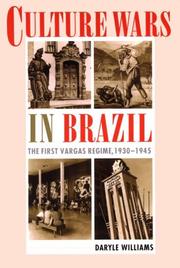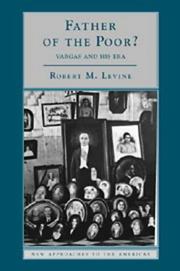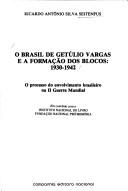| Listing 1 - 7 of 7 |
Sort by
|
Book
ISBN: 029273655X 0292740786 0292771754 Year: 1967 Publisher: Austin ; London : University of Texas Press,
Abstract | Keywords | Export | Availability | Bookmark
 Loading...
Loading...Choose an application
- Reference Manager
- EndNote
- RefWorks (Direct export to RefWorks)
The dominant public figure in Brazil from 1930 until 1954 was a highly contradictory and controversial personality. Getúlio Vargas, from the pampas of the southern frontier state of Rio Grande do Sul, became the dictator who ruled without ever forgetting the lower classes. Vargas was a consummate artist at politics. He climbed the political ladder through seats in the state and national legislatures to the post of federal Finance Minister and to the governorship of Rio Grande do Sul. His career then took him to the National Palace as Provisional President and as Constitutional President, and later as the dictator of his "New State." After his deposition in 1945 and a period of semiretirement, his continuing widespread popularity resulted in his successful come-back campaign in 1950 for the Presidency on the Labor Party ticket. Vargas' contributions to Brazilian political and economic life were many and important. Taking advantage of the power which his political magic provided him, he brought Brazil from a loose confederacy of semifeudal states to a strongly centralized nation. He was a great eclectic, welding into his social, political, and economic policies what he found good in various programs. He was also a great opportunist in the sense that he adroitly took advantage of conditions and circumstances to effect his ends. He was intimately related to the revolutionary changes in Brazilian life after 1930. Vargas, "Father of the Brazilians," attributed achievements such as these to power in his own hands. His foes, however, still feared the political wizard, and they cheered the military when it deposed him. After his return, "on the arms of the people," Vargas saw that the armed forces were determined to repeat history, and in 1954 he chose another path—suicide. All of these exciting events are related in John W. F. Dulles's Vargas of Brazil: A Political Biography. Despite its emphasis on Vargas the politician and statesman, the reader comes to know Vargas the man. For this portrait of Vargas and of Brazil the author has drawn much material from State Department papers in the National Archives and from other public sources, and from interviews with numerous persons who were participants in the events he describes or observers of them. The result is an interesting, revealing, valid account of an important people. Many illustrations supplement the text.
Vargas, Getúlio, --- Brazil --- Politics and government --- Dornelles Vargas, Getúlio, --- Dorneles Vargas, Getúlio, --- BIOGRAPHY & AUTOBIOGRAPHY / General.
Book
ISBN: 8526707922 Year: 1995 Publisher: Rio de Janeiro Fundaçao Getúlio Vargas
Abstract | Keywords | Export | Availability | Bookmark
 Loading...
Loading...Choose an application
- Reference Manager
- EndNote
- RefWorks (Direct export to RefWorks)
Presidents --- Diaries --- Vargas, Getúlio, --- Diaries. --- Brazil --- History

ISBN: 1282903829 9786612903823 082238096X 0822327082 0822327198 9780822327080 Year: 2001 Publisher: Duke University Press
Abstract | Keywords | Export | Availability | Bookmark
 Loading...
Loading...Choose an application
- Reference Manager
- EndNote
- RefWorks (Direct export to RefWorks)
Examines the role of the Brazilian government as it attempted to create a national culture during a fifteen-year period of authoritarian cultural management.
Politics and culture --- Culture --- Culture and politics --- History --- Political aspects --- Vargas, Getúlio, --- Dornelles Vargas, Getúlio, --- Dorneles Vargas, Getúlio, --- Brazil --- Politics and government --- Cultural policy. --- Vargas, Getúlio, - 1883-1954.

ISBN: 0521585155 0521585287 Year: 1998 Publisher: Cambridge ; New York, NY, USA : Cambridge University Press,
Abstract | Keywords | Export | Availability | Bookmark
 Loading...
Loading...Choose an application
- Reference Manager
- EndNote
- RefWorks (Direct export to RefWorks)
"Biographical essay on Getúlio Vargas, dictator and elected president 1930-45 and 1951-54, focuses on inconsistencies in his claim to be a social reformer. Includes a creative collection of documents and photographs showing Vargas' many images. Extremely useful for students"--Handbook of Latin American Studies, v. 58.
Vargas, Getúlio, --- Brazil --- Brésil --- Economic policy. --- Politics and government --- Social policy. --- Politique économique --- Politique sociale --- 800 Collectie Vlaams Vredesinstituut --- 830 Economie --- 841 Politiek Bestel --- 841.4 Politieke figuren --- 842 Media --- 844 Sociale Structuur --- 882.2 Zuid-Amerika --- Vargas, Getúlio, --- Brésil --- Politique économique --- Dornelles Vargas, Getúlio, --- Dorneles Vargas, Getúlio,

ISBN: 8504002063 Year: 1985 Volume: 22 Publisher: São Paulo, SP, Brasil : Companhia Editora Nacional,
Abstract | Keywords | Export | Availability | Bookmark
 Loading...
Loading...Choose an application
- Reference Manager
- EndNote
- RefWorks (Direct export to RefWorks)
World War, 1939-1945 --- 2ème guerre mondiale --- Vargas, Getúlio, --- Brazil --- Brésil --- Politics and government --- Foreign relations --- Politique et gouvernement --- Relations extérieures
Book
ISBN: 9780292762978 9780292758650 0292762976 0292758650 0292768176 Year: 2014 Publisher: Austin, Tex. University of Texas Press
Abstract | Keywords | Export | Availability | Bookmark
 Loading...
Loading...Choose an application
- Reference Manager
- EndNote
- RefWorks (Direct export to RefWorks)
Modern Architecture in Latin America: Art, Technology, and Utopia is an introductory text on the issues, polemics, and works that represent the complex processes of political, economic, and cultural modernization in the twentieth century. The number and types of projects varied greatly from country to country, but, as a whole, the region produced a significant body of architecture that has never before been presented in a single volume in any language. Modern Architecture in Latin America is the first comprehensive history of this important production. Designed as a survey and focused on key examples/paradigms arranged chronologically from 1903 to 2003, this volume covers a myriad of countries; historical, social, and political conditions; and projects/developments that range from small houses to urban plans to architectural movements. The book is structured so that it can be read in a variety of ways--as a historically developed narrative of modern architecture in Latin America, as a country-specific chronology, or as a treatment of traditions centered on issues of art, technology, or utopia. This structure allows readers to see the development of multiple and parallel branches/historical strands of architecture and, at times, their interconnections across countries. The authors provide a critical evaluation of the movements presented in relationship to their overall goals and architectural transformations.
Architecture --- History --- Histoire de l'architecture --- 20e siècle --- Amerique du Sud --- Amérique Latine --- Architectuur --- architectuur [objectgenre] --- Latijns-Amerika --- Histoire --- architecture [object genre] --- Latin America --- Architecture - Latin America - History - 20th century --- Bullrich, Francisco. --- Le Corbusier, --- Williams, Amancio. --- Vargas, Getúlio,
Book
ISBN: 1945234091 1945234261 9781945234262 9781945234095 1945234024 9781945234026 9798890858061 Year: 2017 Publisher: Raleigh, North Carolina : Editorial A. Contracorriente,
Abstract | Keywords | Export | Availability | Bookmark
 Loading...
Loading...Choose an application
- Reference Manager
- EndNote
- RefWorks (Direct export to RefWorks)
Press and politics. --- Journalism --- Government and the press. --- Government and the press --- Press and politics --- Politics and the press --- Press --- Advertising, Political --- Writing (Authorship) --- Literature --- Publicity --- Fake news --- Press and government --- Press policy --- State and the press --- Freedom of the press --- Political aspects. --- Political aspects --- History --- Government policy --- Vargas, Getúlio, --- Lula, --- 1900-1999 --- Brazil. --- al-Barāzīl --- Barāzīl --- Brasil --- Brasile --- Brasilia --- Brasilië --- Brasilien --- Brazili --- Brazili Federativlă Respubliki --- Brazilia --- Brazilië --- Brazilii︠a︡ --- Brazilii︠a︡ Federativ Respublikaḣy --- Braziliya --- Braziliya Federativ Respublikası --- Brazilská federativní republika --- Brazylia --- Brésil --- Burajiru --- Federale Republiek van Brasilië --- Federative Republic of Brazil --- Federativna republika Brazil --- Federativna republika Brazilii︠a︡ --- Federat︠s︡iėm Respublikė Brazil --- Fedėratyŭnai︠a︡ Rėspublika Brazilii︠a︡ --- Gweriniaeth Ffederal Brasil --- Pa-hsi --- Pa-se --- Pa-se Liân-pang Kiōng-hô-kok --- Pederatibong Republika sa Brasil --- Pindorama --- República Federal del Brasil --- Republica Federale di u Brasile --- Republica Federativa del Brazil --- República Federativa do Brasil --- Rèpublica fèdèrativa du Brèsil --- Republik Kevreel Brazil --- République fédérative du Brésil --- Tantasqa Republika Wrasil --- Tetã Pindorama --- Wrasil --- Федэратыўная Рэспубліка Бразілія --- Федеративна република Бразилия --- Федерациэм Республикэ Бразил --- Бразил --- Бразили --- Бразили Федеративлă Республики --- Бразилия --- Бразилия Федератив Республикаhы --- Бразілія --- البرازيل --- برازيل --- ブラジル --- Brasili --- Brazilii͡ --- Brazilii͡a Federativ Respublikaḣy --- Federale Republiek van Brasili --- Federativna republika Brazilii͡ --- Federat͡siėm Respublikė Brazil --- Fedėratyŭnai͡a Rėspublika Brazilii͡
| Listing 1 - 7 of 7 |
Sort by
|

 Search
Search Feedback
Feedback About UniCat
About UniCat  Help
Help News
News